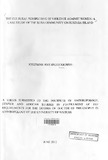| dc.description.abstract | This study set out to explore the forms of violence against women on Rusinga Island and how it relates to enculturation and the women's perceptions of it. The study sought to address the following research questions: What forms of violence against women exist on Rusinga Island? To what extent is the violence against women a result of enculturation? And, does women's socialization make them perceive the violence against them as normal, hence influencing its perpetuation?
The overall objective of the study was to explore the forms of violence against women on Rusinga Island and the relationship between the violence and enculturation. The specific objectives were to determine the forms of violence against women on Rusinga Island, to investigate the relationship between this violence and enculturation and to establish the perceptions of women regarding the presumed harmful beliefs and practices that perpetuate violence against women. The study was guided by the radical feminist theory which analyses patriarchy as the primary cause of women's oppression.
Data were collected using the survey method, semi-structured interviews, direct observation, focus group discussions and key informant interviews. Data from the survey were analyzed using the SPSS computer programme and the findings presented in tables of frequencies, percentages and bar charts. Qualitative data were sorted out, tabulated and interpreted in relation to the research objectives. The findings are presented using verbatim quotes and narratives. The study found that physical, emotional, sexual and economic violence against women exist to a great extent on Rusinga Island.
All these forms of violence are greatly fuelled by the deeply ingrained cultural beliefs, practices and perceptions that not only help to perpetuate the violence, but also make it difficult to eradicate the vice. Various traditional beliefs and practices are a great source of violence for women. These include the present day practice of polygyny, which is very common in the study area, wife inheritance, forced marriage and practices around burial rites for widows who have not yet been inherited. Others include the traditional practices surrounding young women who have reached puberty, as they are considered to be impure and polluting, with the perceived ability to cause a spell or doom, and wipe away an entire homestead.
The study, therefore, concluded that violence against women exists in various forms which include physical, emotional, sexual and economic on Rusinga Island. Violence against women is perpetuated by the way the people are socialized to believe that men have unlimited rights over women, particularly wives. The study, therefore, recommends sensitization of the community as a whole on human rights in general, and on the rights of women in particular. Similarly, women should be encouraged to report incidents of violence to relevant authorities. Finally, various cultural beliefs and practices that perpetuate violence against women should be reconsidered and alternative rites prescribed by clan elders. | en_US |

